“Absent Christian”… Confiscation of real property of Idlib’s Christians
Enab Baladi – Ninar Khalifa
“We have nothing left in Idlib, no properties, houses, or rents. The Sharia Committee seized everything.”
With these words, Issa (a pseudonym) from Idlib city described to Enab Baladi what happened to his family’s property years after the Islamic factions took control over the city.
Issa added, “We had a house, an agricultural land, and a number of stores, all of which, were rented through my father’s agent, who used to transfer the rents to us on a regular base.”
He continued saying, in 2019, the Sharia Committee issued a decision providing for the confiscation of any property that was not managed or supervised by its original owners.”
“Due to the decision, our properties were confiscated, while the rents were paid to the committee,” Issa said.
Issa added, “We tried so hard to restore our properties through our agent who had a general power of attorney; however, we recovered nothing.”
“We also tried to move our house furniture to where we live currently in another province, but the committee refused to remove anything outside of Idlib, especially from the Christian-owned properties,” Issa said.
The confiscation of property owned by Christians in Idlib was not limited to those who left the province.
For example, whenever Issa’s 86-year-old grandmother, who lives by herself in one of the Christian villages in Idlib, left her one-room house to visit her children in other governorates, she used to find the house door’s lock broken and the house inhabited by a foreign family on the pretext of being displaced.
Issa indicated that this happened repeatedly to his grandmother, who used to go to the Sharia Committee to file a complaint; nevertheless, she had to sleep outside her house for at least a month every time until the committee finds another housing alternative for the displaced family.
Besides, many faction leaders and elements have taken over civilians’ houses and lived in them without the consent of their owners.
Regarding this subject, Issa recounted an incident in 2015, after the Islamic factions established control over Idlib city. Back then, his father and uncles went to visit the family home and take their belongings, to their surprise, they discovered that the house was inhabited by a Tunisian and a French man along with their wives, who refused to let Issa’s family enter the house.
“Absent Christian”
Rental fees were also imposed on the residents of the Christian villages of the Idlib countryside, who had been displaced from other provinces. They had to pay rents to the Sharia Committee according to Mazen (an alias name), one of those who were displaced to the Christian village of al- Yakubiyah in Idlib countryside after the former “Free Syrian Army” (FSA) took control of it in 2012.
Mazen told Enab Baladi that since the “Hay’at Tahrir al-Sham (HTS)” controlled the village, it started to impose rents on people who live in houses owned by Christians.
According to Mazen, the HTS regarded confiscated properties as “spoils of war.”
He pointed out that he paid 50,000 Syrian pounds (SYP) as rental fees for a number of houses.
The committee has rented all the houses, lands, and shops of the three neighboring villages, al- Yakubiyah, al-Jadidah, and al-Qaniyah, according to Mazen.
He said, civilians were forced to pay rents to the committee, including the widows and female members of families of “martyrs;” nevertheless, the Sharia Committee excluded the HTS fighters from paying the rental fees.
Mazen added that the committee charged rents even for the unfinished houses. According to him, it counted the number of years the owners inhabited the still uncompleted houses and told them that the “investment period” has ended, and these houses are no longer considered their property; therefore, they have to pay the rent to the Sharia Committee.
Enab Baladi obtained a photo of a “civil lease” issued by the General Directorate of Real Estate, the branch of Jisr al-Shughur administrated by the HTS.
The lease shows that the directorate has rented a house owned by a Christian citizen in al- Yakubiyah village for three months.
Remarkably, the HTS refers in the contract to the original owner of the property as an “absent Christian” in reference to the local Christian residents of the village, without mentioning the owners’ real name.
It is worth mentioning that the village’s original Christian residents were displaced to other regions and their properties were confiscated by the Sharia Committee under the pretext of their absence.
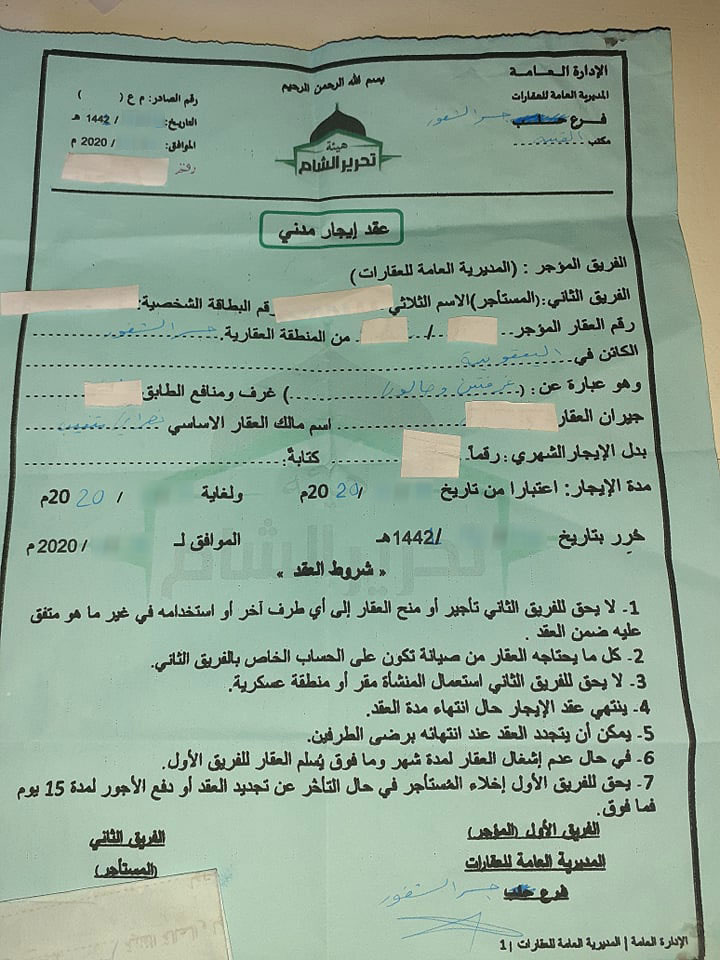
A lease contract shows HTS renting a house in al- Yakubiyah village in Jisr al-Shughur. The house belongs to a Christian citizen referred to as “Absent Christian” in the contract – Idlib 2020 (Enab Baladi)
Meanwhile, a state of loss of rights had befallen thousands of Christian families in Idlib province. These families had to leave their cities and villages, emigrate abroad, or flee to other Syrian areas after the Islamic factions’ control, leaving behind their properties of houses, lands, and shops.
On the other hand, those who chose to stay were faced with harassment that made them feel unwelcomed in their own areas.
The factions did not allow them to practice their rites and religious rituals in public, hold ceremonial events or show their religious symbols, not to mention the assaults, the looting, and exploitation that have affected the churches.
In 2012, the FSA factions gained control over the majority of areas of Idlib countryside, and the village of al-Ghasaniyah was the first Christian area to fall under its control.
Between 2015 and 2018, the Islamic factions controlled Idlib city and the rest of the province’s countryside. Back then, the majority of Christians left the area, while a few families remained, mostly elderly people.
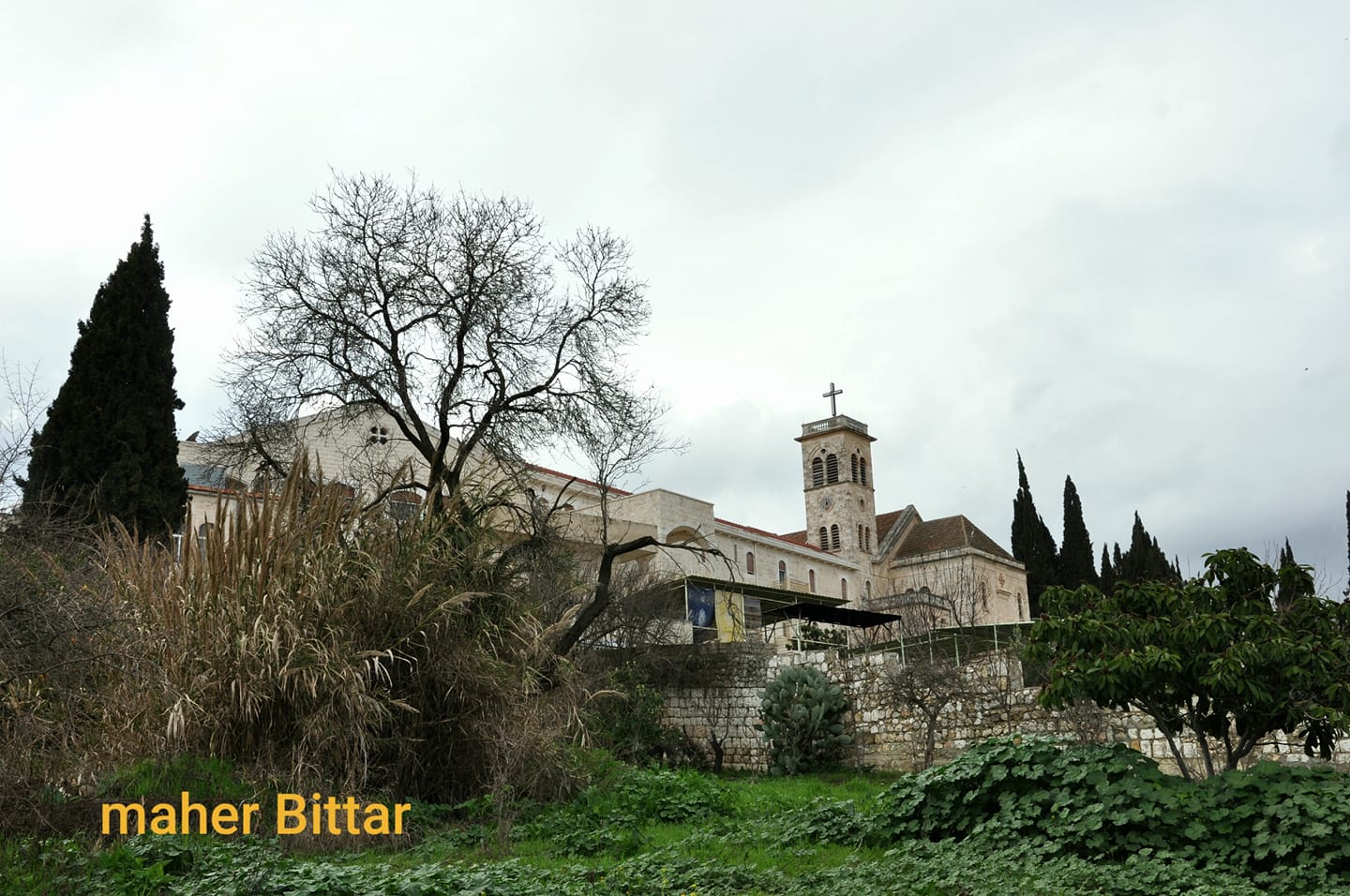
The “Latin” Monastery and “Saint Joseph” Church in al- Qaniyah village in Idlib countryside (Maher Bitar’s Facebook account)
The confiscation of hundreds of real estate as a “weapon of war”
Although no official decision was made by the HTS or other dominant factions in Idlib that allows the confiscation of absent Christians’ property, human rights organizations and eyewitnesses documented hundreds of expropriations and property and rents seizures, without acknowledging the authorization granted by the owners of these properties to their agents in the governorate.
Meanwhile, the “Syrians for Truth and Justice” organization (STJ), documented the confiscation of HTS of at least 550 homes and shops in Idlib city, owned by Christian people, between late 2018 and mid-October 2019.
In addition, the HTS, the “Guardians of Religion Organization (GRO),” and members of the “Turkistan Islamic Party (TIP)” have taken over more than 750 houses owned by Christian families in the villages of Jisr al-Shughur countryside from the beginning of 2018 until late December 2018, under the pretext that their owners were absent.
The STJ organization reported eyewitnesses from the residents as saying that the factions leased these properties for their own benefit. According to the eyewitnesses, the factions gave access to their elements’ families to live in the confiscated houses.
The eyewitnesses added that the GRO not only expropriated houses throughout the Jisr al-Shughur area but also confiscated agricultural lands and took over their guardianship.
In late 2018, the HTS fully appropriated three markets in Idlib city, namely, Khan Kabbad for cereals,” Khan Fahdi for selling oil,” and Khan Ghannoum.”
These street markets include warehouses and shops owned by some Christian merchants and they are of great symbolic importance for Idlib’s people.
Moreover, in 2017, the HTS has taken over the only Christian church in Idlib city, a section of which has been transformed into an educational institute after renting it to someone for investment.
According to a local source, the HTS’ rental revenue from the Christian-owned houses in Idlib alone has exceeded 70,000 USD per year.
The “International law” prohibits the appropriation of property on religious grounds
In an interview with Enab Baladi, the Head of the STJ organization, Bassam al-Ahmad, pointed out that the statistics of confiscated property is the minimum figures that had been documented by the organization.
Al-Ahmad explained that in the appropriation of property cases, the owners were accused of many charges by the factions, such as being from the al-Assad’s loyalists.
Other times, the confiscation was carried out under the pretext of their absence from the region.
Al-Ahmad added that these reasons do not justify the confiscation of the Christian people’s property and giving it to others, as many of them have fled their areas after “Jihadist” groups have taken control of their regions.
Al-Ahmad pointed out that “the laws of war” prohibit unlawful seizure of property, especially in cases where the properties are confiscated because their owners are “Christians” and that the dominant authority in the region is “Islamic jihadist religious authorities.
He noted that the confiscation of properties in Syria was happening for political reasons sometimes and other military ones, but in this case, the reasons are religious.
Al-Ahmad asserted that the appropriation of houses and property of Idlib’s Christian people by the HTS and other Islamic factions is an “explicit violation of the international humanitarian law and a breach of its obligations as the factions remain one of the parties to the Syrian conflict.”
It also violates rule No. 50 of “Customary International Humanitarian Law (IHL),” which says, “the destruction or seizure of the property of an adversary is prohibited unless required by imperative military necessity.”
Regarding the bodies responsible for documenting the unlawful seizure of property, al-Ahmad said that affected people could return to human rights organizations and international commissions of inquiry to report these violations.
Al-Ahmad pointed out that currently, there is no judicial authority that can decide on these issues because the ruling factions are not committed to any international laws.
He said, what the factions are doing is nothing but “arbitrary seizure operations.”
The head of the STJ organization considered that if the political situation did not change, and there was no authority in the region that respects people and is committed to returning them to their areas, it would be difficult for the original real estate owners to restore their confiscated properties.
Al-Ahmad stressed that the affected people should keep all indications of their property rights to their homes, stores, agricultural lands, and others, including legal papers, documents, bills, contracts, and court decisions.
He added, millions of Syrians have lost their property during the war years, of which many could return to their areas at any moment if a political change occurs.
Compensation claim
The Syrian lawyer and Head of the “Free Syrian Lawyers” organization, Ghazwan Koronfol, called the expropriation of the property of Christians in Idlib province a “property usurpation,” which is the takeover of someone’s property without a legal basis.
Koronfol said to Enab Baladi that if the seizure was accompanied by the takeover of the property’s contents, yield, or the sale of its crops, then the crime of theft is added to the violation act.
As for the mechanism by which the original owners can restore their rights, Koronfol pointed out that this is possible if there was state authority over the region and not “militias” domination.
He also noted that any person affected by the unlawful seizure could claim the ownership with the existence of a property title, since all areas under the control of the factions in Syria’s north and north-western regions are currently limited by legal boundary, and registered in the cadastre.
Koronfol noted that landowners victims of property seizures could demand compensation for the damage inflicted upon them.
In addition, if the property was agricultural land, its owner could claim the value of the past seasons’ yields and the compensation for any other damages that may have affected the land due to erroneous practices.
Considering that property documents were damaged or lost in most cases, property owners could resort to the electronic copies of state records in the Syrian capital, Damascus, according to Koronfol.
The owners can also prove their possession by whatever available means, including a local inquiry with the village chief and the neighborhood, the provision of any document that proves the owner’s payment of taxes on the property, financial fees, or other different invoices.
As for what the owner could do within the current conditions and the possibility of resorting to legal proceedings, Koronfol noted that courts operating in factions-controlled areas have no legitimacy to exercise judicial work.
He said, these courts are not committed to the Syrian law and do not view the confiscation matter as a criminal offense of “property usurpation.”
According to Koronfol, these courts are “mere tools used to legitimize the crimes of people in power.”
These courts could frame any charges, impose a tribute, or consider the property a “legitimate” loot.
HTS: “properties are under the guardianship of the “Trust Office”
The General Manager of the “General Directorate of Real Estate in the Liberated Areas,” Abdul Rahman Zain, denied the allegations of HTS confiscation of Christians-owned properties in Idlib.
Speaking to Enab Baladi, Zain justified the cases in which the seizures were carried out. He said that “after the liberation of Idlib city, many people and entities took over most of the properties of Christian people illegally.”
According to Zain, “these people exploited, damaged, and used the properties for their benefit due to the absence of their owners.”
“This prompted the “Directorate” to intervene to control the situation and limit the destruction of the properties, to ensure their safety for their owners when they return,” Zain said.
He added, “over several years, the “Directorate” recovered and seized a number of these properties and put them under the “Trust Office” protection to handed them back to their owners after proving ownership and physical presence in the area.”
Concerning the criteria for housing families in houses that are not theirs, Zain pointed out that the majority of those who occupy these properties are displaced, with special conditions (a widow, an injured person, elderly people, people with disabilities…”
He noted that the “Directorate” is the authority that receives complaints from real estate owners. According to Zain, the “Directorate” guarantees these properties’ safety from being damaged after gaining guardianship over them.
Moreover, the “Directorate” is responsible for maintaining any damage caused by the occupier assigned by the “General Directorate of real estate” before handing the house over to its owner.”
Zane talked about cases in which properties were returned to their original owners after proving the ownership; others were returned with the rents that preceded the restoration process.
According to him, many people who refused to stay in the liberated areas received their property furniture from the “General Directorate of Real Estate” and sold it or transferred it to the Syrian regime’s regions.
Who guarantees the property rights?
The hopes for the Christian families to return to their confiscated houses in Idlib are diminishing, as the region’s chaos and loss of rights have boosted demographic change and emptied entire cities and villages of their local inhabitants.
Even though the armed factions pledge in their statements and officials’ speeches to protect property in areas under their control, the measures they impose raise controversy and doubts about the seriousness of their commitment to their promises.
There is no justification for imposing rents and fines on all citizens except their elements, nor are there any real guarantees to Christian people to restore their property rights.
In the absence of setting limits between the usufruct right and the seizing act by any authority, and the deterioration of the Judicial and impartial courts’ role, the “eviction” matter remains a nightmare for the people, which threatens their return and restoration of the property.
The Christians of Idlib province are centered in Idlib city, some areas of Jisr al-Shughur, and the villages of al- Yakubiyah, al-Jadidah, al-Ghasaniyah, al-Qunyah, and Halluz.
The Christians of Idlib belong to different denominations, the largest of which is the Greek Orthodox, the Armenians, the Latins, the Protestants, and the Evangelical Protestants “Baptists and Nasserists.”
if you think the article contain wrong information or you have additional details Send Correction
النسخة العربية من المقال
-
Follow us :

















 A
A
A
A
A
A
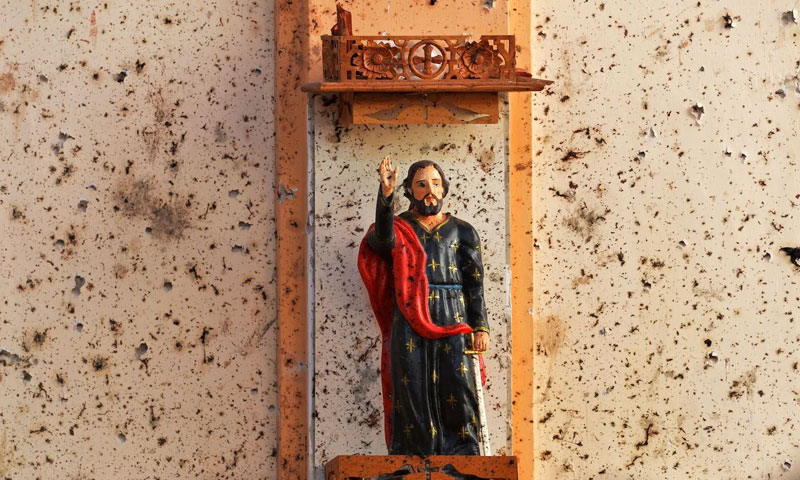

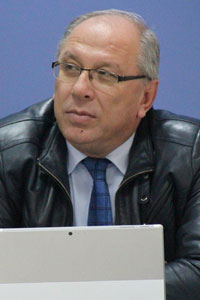
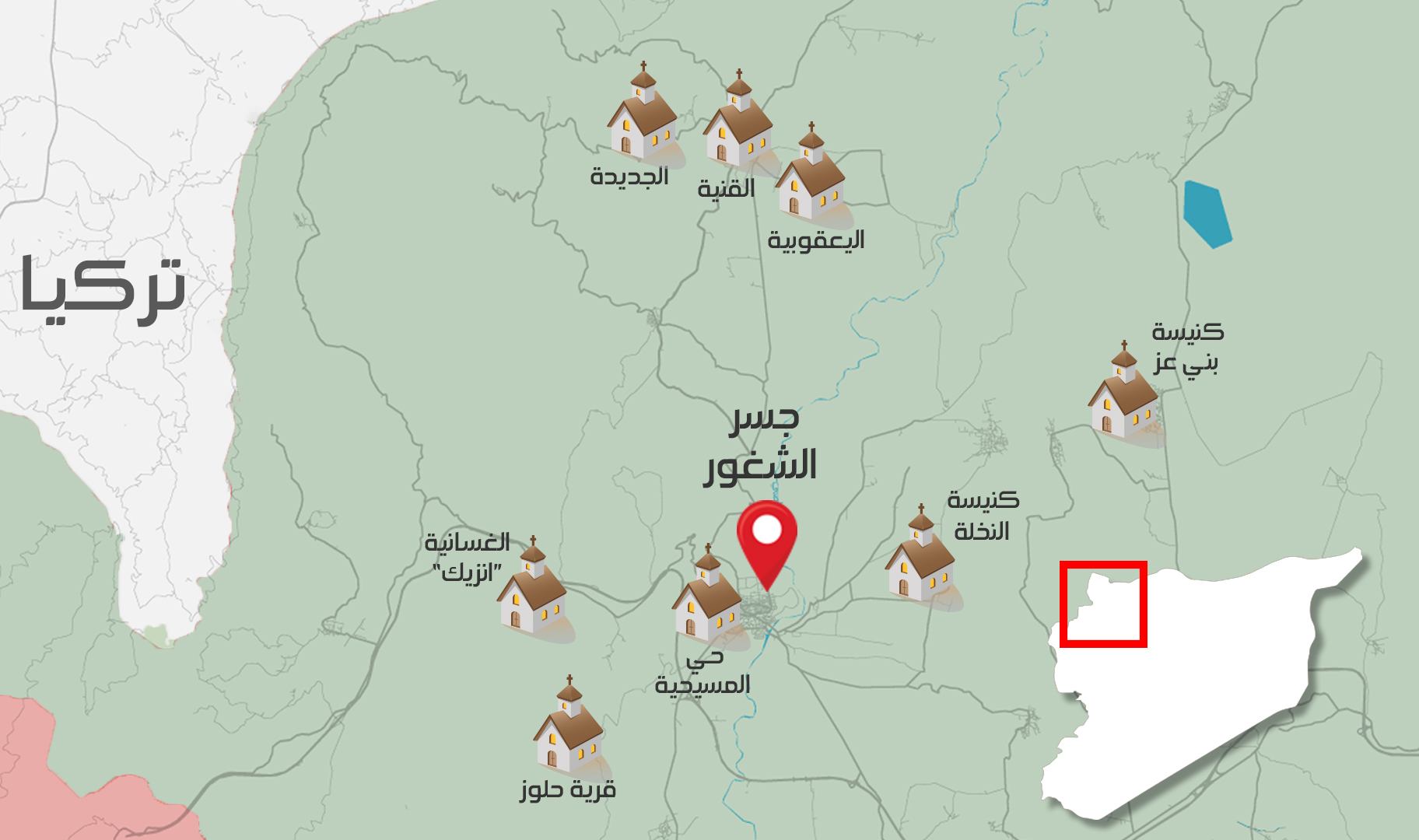


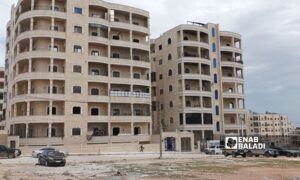
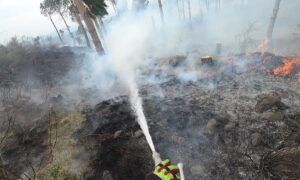
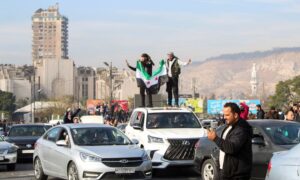
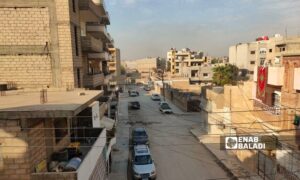
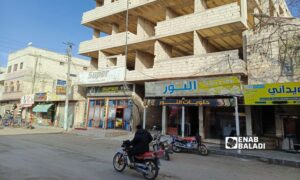
 More HLP
More HLP